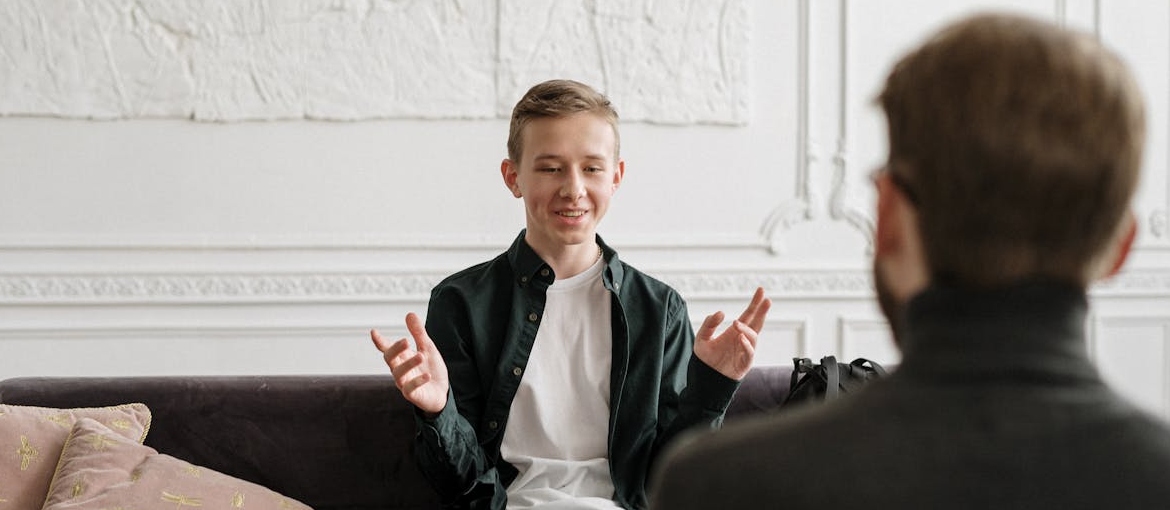Talking to teens about substance use can feel impossible. You might worry they won’t listen—or worse, shut down. But there’s a method that works differently. Motivational interviewing for teens helps them feel heard instead of judged. It’s a way to spark real conversations and support change without pressure. Many therapists use it to help teens explore their choices and build trust. This can be especially helpful early on, before things get worse. If your teen struggles with drugs or alcohol, knowing what to do next can be overwhelming. Drug and alcohol treatment centers in West Virginia often use this method as part of early intervention. It’s not a fix-all, but it’s a strong starting point. Keep reading to learn how this approach works and when it makes the most sense for your teen.
Understanding Motivational Interviewing and When to Use It
Motivational interviewing is a practical tool for psychotherapeutic work, but it might not be useful in every situation. Still, research shows promising results advocating for its use.

Does Motivational Interviewing Work with Adolescents?
Recent meta-analyses show consistent effect sizes when motivational interviewing (MI) is used for addressing adolescent substance use. According to one meta-research study, nearly 70% of those who experienced MI statistically significantly improved substance use outcomes regardless of whether it was combined with another psychotherapeutic approach or not.
Even brief motivational interviewing ensures positive outcomes. A study that followed a motivational intervention on alcohol consumption and drug use for high-risk teens in a primary care clinic had positive results as shown by a 3-month follow-up survey. Teens of the age of 12 to 18 years old reported last marijuana use, lower perceived prevalence of marijuana use, fewer friends who use marijuana, and lower intentions to use marijuana in the next 6 months.
A study on group motivational interviewing gave promising results by investigating change talk as a mechanism to spike motivation (change talk implies client speech arguing for change). As a result of the intervention, there were decreased alcohol intentions, alcohol use, and heavy drinking three months later. Investigators concluded that the facilitator’s use of open-ended questions and reflections significantly increased teens’ engagement.
What makes motivational interviewing for youth a successful technique is participation. Adolescents feel included, which encourages them to make self-motivated decisions rather than accepting rules someone else imposed on them. As this is an especially sensitive and rebellious time in one´s life, making your own decisions is of even greater importance.
Motivational Interviewing When to Use This Approach
The Substance Abuse and Mental Health Services Administration (SAMHSA) collects data on substance users starting at age 12, which shows that alcohol and drug abuse is common among teens. The majority of adolescents do not see substance use as a problem. On the contrary, they might perceive it as a desirable behavior. Consequentially, they will not be motivated to change anything about their state.
This area is where motivational interviewing for substance abuse can do much good. It helps teens who are not yet ready for full sobriety but are open to discussion. It’s best suited for early intervention for individuals with mild-to-moderate substance use issues. However, it is not an appropriate intervention for teens in crisis. Due to the nature of this psychotherapy technique, it can be easily implemented in schools, rehab centers, and family therapy settings.

Core Principles of Motivational Interviewing for Teens
Those who choose to use MI in individual therapy for addiction should follow certain principles. Honoring those principles increases the chance of successful motivational interviewing for teenagers, as it helps teens feel seen, acknowledged, and included. A therapist at Harmony Ridge Recovery Center will rely on the following principles of motivational interviewing for teens:
- Building rapport
- Creating a safe space
- Encouraging autonomy and self-motivation
Building Rapport and Creating a Safe Space
Anyone, but teens especially, feel comfortable opening up only when they feel understood and respected. For such an experience to be possible, a psychologically safe space needs to be established, and rapport needs to be built between the two people (the therapist and the adolescent).
- A psychologically safe space is an environment where teens feel safe speaking up without fear of judgment. When this environment is established, youngsters feel safe sharing their thoughts, arguments, and ideas. This environment encourages active participation in motivational interviewing.
- Building rapport refers to the therapist’s ability to establish a comfortable, harmonious relationship where both sides in an MI session feel understood and valued. A good rapport helps facilitate effective communication and establish a meaningful connection.
Encouraging Autonomy and Self-Motivation
There are several ways to encourage autonomy and induce self-motivation for change. Open communication plays a key role. It’s important to shift focus from discouraging behavior to encouraging a change. For instance, instead of demanding that a teen quit using substances, ask them what would help them change how they go about substance use. This approach empowers them to bring forward their ideas and make their own decisions.
Furthermore, by empowering teens to suggest the path of change, we are giving them control over their own recovery process. This sense of control contributes to motivation to start the recovery and adherence to the process.

Key Motivational Interviewing Techniques for Adolescents
The success of motivational interviewing for teens depends on several factors. Good timing, an adequate target group, and adherence to principles are essential. The choice of techniques is also crucial. Here are some techniques you can use:
- Open-ended questions that spark self-reflection: Instead of offering options for change, a therapist focuses on encouraging self-exploration during MI. A teenager should be asked open-ended questions rather than questions that require yes/no answers. For instance, a therapist may ask, “What do you like and dislike about using substances?” This type of question opens a topic and provides material for a conversation.
- Reflective listening to show understanding: Active and reflective listening are crucial aspects of any psychotherapy approach, including motivational interviewing for teens. By reflecting and repeating back what a client (in this case, an adolescent) said without judgment, trust is being built between the therapist and the teen. This reflection makes things feel heard and validated and makes them more willing to engage. Sentences such as “It sounds like you’re feeling pressured by your friends to use” exemplify reflective listening.
- Motivational interviewing activities for adolescents: A great way to address topics during motivational interviewing is by introducing activities in addition to open conversation. A simple yet efficient technique is creating a pros and cons list. They help teens acknowledge and weigh the benefits and risks of substance use. A decisional balance worksheet helps teens explore what they would gain or lose by making a change. Finally, role-playing scenarios support skill-building as they allow you to try reacting to drug- or alcohol-related situations that can happen in real life while in a safe space established during motivational interviewing (e.g., how to reject drugs or fight peer pressure).

Seeking Professional Support for Lasting Change
Helping a teen struggling with substance abuse is a specific challenge, as there are many bodily changes, life changes, and peer impacts, complicating things. Teens are typically rebellious and don’t like being told what to do. For this particular reason, motivational interviewing is a great tool to help them overcome their substance misuse situations.
Relying on professionals is crucial. A trained psychotherapist will be able to build an environment filled with understanding and support, overcome barriers in the treatment program, and ensure long-lasting results.
Addiction Treatment Centers in West Virginia and Therapy Solutions
Dependence on or addiction to any substance requires treatment. At Harmony Ridge Recovery Center, you can count on personalized treatment programs catered to the teen-specific needs. Furthermore, we customize our programs to address individual challenges, triggers, and circumstances. By combining motivational interviewing for teenagers with other psychotherapeutic treatments and medical support, we ensure long-lasting and sustainable results. Motivational interviewing is important for boosting teen participation, engagement, and adherence. Harmony Ridge Recovery Center offers a safe, structured environment, making it a practical and wise choice for anyone in the surrounding area:
- For anyone seeking professional support near Cambridge, we offer rehab Cambridge OH relies on. You can count on our medication-assisted treatment (including medical detox), residential treatment, intensive outpatient program, and partial hospitalization.
- We are at the disposal of residents of Marietta, and our rehab center Marietta OH recommends can help those struggling with either alcohol or drug addiction. With both inpatient and outpatient settings, we can support you no matter your lifestyle and life circumstances.
- If you live in or near Fairmont, turn to our rehab center Fairmont WV trusts. Its peaceful location, modern facilities, and professional staff can support recovery for any teen struggling with substance abuse.
- Our rehab Athens OH residents turn to is a perfect choice for anyone residing near Athens and looking for a drug or alcohol addiction program that can address specific teenagers´ needs.

Why Evidence-Based Treatment Matters
Evidence-based treatments are essential for substance use recovery. They focus on long-term results rather than short-term fixes. Moreover, they address the underlying causes of maladaptive coping, reframe thinking patterns, and motivate people to embrace change. Personalized, holistic approaches help teens build resilience and skills to support healthy lifestyles.
Addressing Common Barriers in Motivational Interviewing for Youth
Although motivational interviewing is a great resource for working with teens, it is not always easy to implement it. There can be quite a lot of resistance, and certain barriers can come into play. It’s on professional therapists to address these work obstacles and ensure that motivational interviewing for teens is giving the best results.

Dealing with Resistance and Denial
Resistance is a natural part of the healing process. The concept applies to any age, problem, or psychotherapeutic technique. Even when we desire changes, they can be challenging, leading us to attempt to resist them. Additionally, changes can be painful even when positive, adding to both conscious and unconscious resistance to therapy.
Motivational interviewing addresses this resistance and ensures active participation. Therapists should meet teens where they are rather than pushing them to find themselves in a certain place (e.g., to instantly quit using substances). They can start the process by asking, “On a scale of 1-10, how ready are you to change?” and work from there. The initial answer might be that they don’t want to change, completely denying the need for it. The goal is for this answer to change over time through trust and communication.
Balancing Encouragement with Realistic Expectations
Motivational interviewing for teens focuses on encouragement but sets realistic expectations. It’s important to acknowledge that teens don’t always quit immediately, and that’s okay. Success is measured in progress, not perfection. We want to get them on board with the change, and any advancement counts.
Therefore, goals should be achievable and teen-friendly, realistic, and pressure-free. This approach leads to the sustainability of the achieved results and a willingness to embrace change.
Helping Teens Take the First Steps Toward Change
Helping teens through substance use isn’t easy, but you’re not alone. Many families face this. Motivational interviewing for teens can make a real difference. It’s not about forcing change—it’s about giving them space to choose it. When teens feel heard, they’re more likely to engage. That’s why this approach works. It builds trust and encourages small but meaningful steps forward. If your teen feels stuck, resistant, or unsure, this method can help open the door. Trained therapists use motivational interviewing activities for adolescent children to help them explore their feelings without pressure. Real change takes time, and that’s okay. What matters most is taking that first step. If you’re unsure what to do next, talk to someone who can help. Support is here. You don’t have to figure this out alone.
Sources:
https://pmc.ncbi.nlm.nih.gov/articles/PMC3496394/
https://www.sciencedirect.com/science/article/pii/S0740547207002437
https://psycnet.apa.org/buy/2014-45102-001



